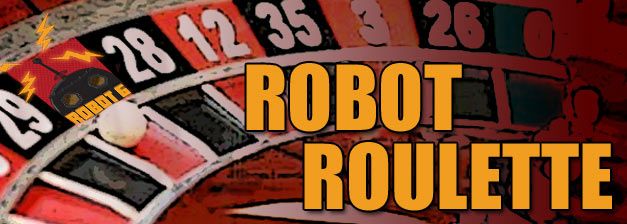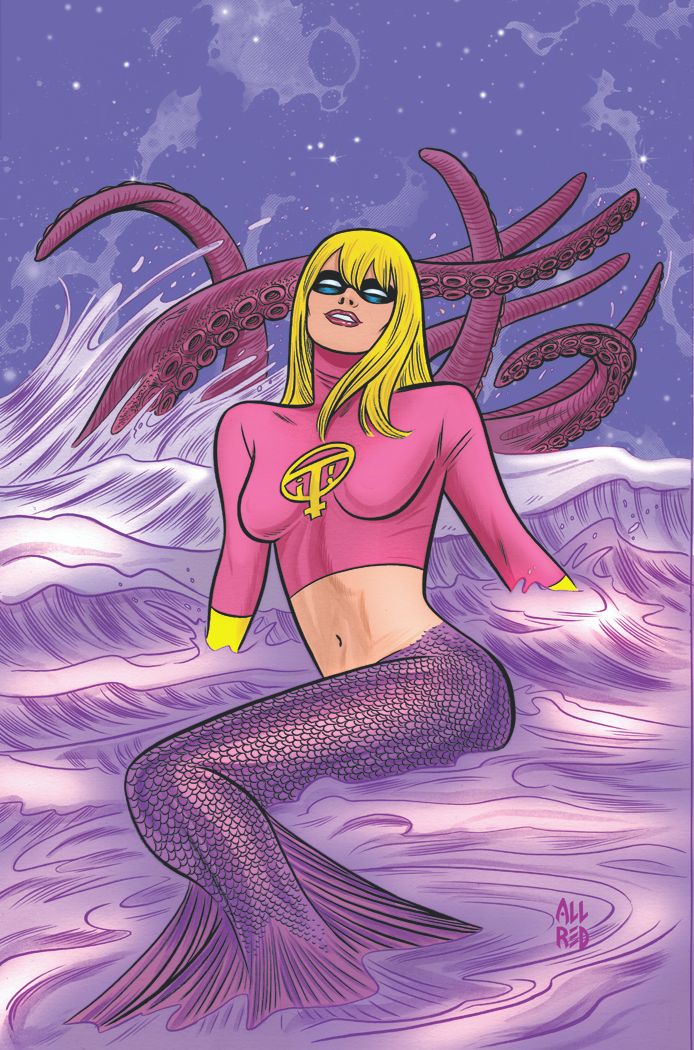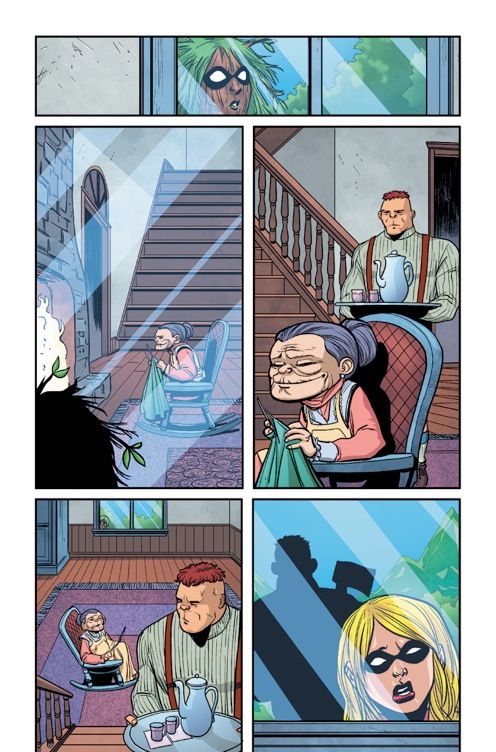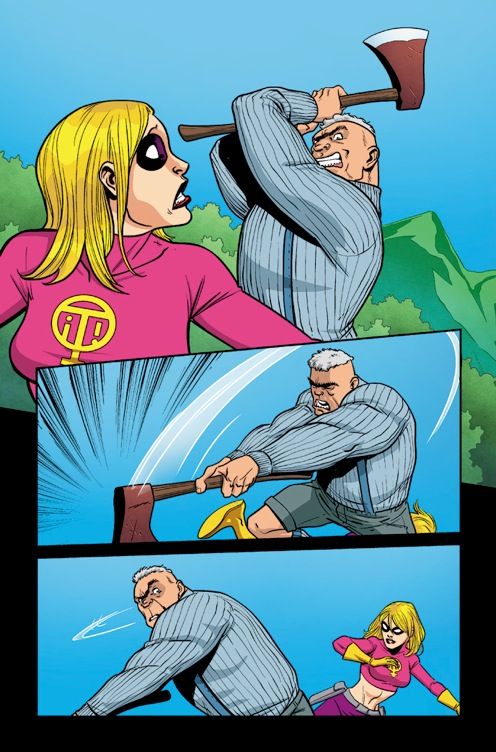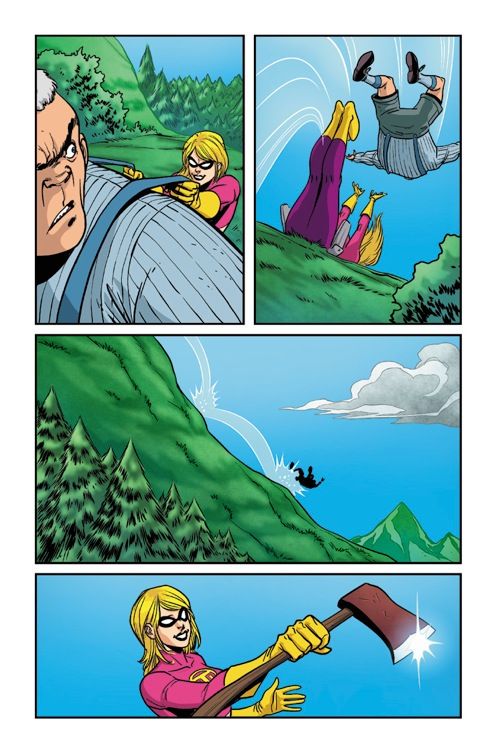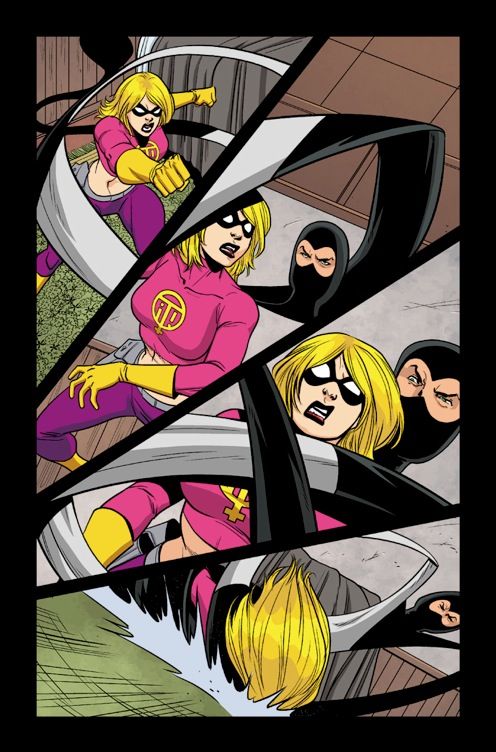Thirty-six questions. Six answers. One random number generator. Welcome to Robot Roulette, where creators roll the virtual dice and answer our questions about their lives, careers, interests and more.
Today we welcome Jamie S. Rich, writer of You Have Killed Me, Spell Checkers, Bobby Pins and Mary Janes, A Boy And A Girl, and It Girl & the Atomics -- for which he has given us an exclusive preview of issue #7, featuring the art of Mike Norton. It arrives in stores this Wednesday.
Now let’s get to it ...
*****
3. If someone gave you $10,000 a week for life, no strings attached, what would you spend it on?
I think I'd get bored of any outrageous spending rather quickly. Most freelancers in creative fields know how quickly things like books and DVDs pile-up, so that kind of consumption gets old. I think once I have set myself up in a living situation that is comfortable, upgrading my apartment and furniture and the like, I'd probably ease back and keep stashing it away. My life philosophy at this point is to forever fret about tomorrow, and always having more money than I need is a luxury unto itself. Then again, I could also finance a lot of comics, pay my friends whom I collaborate with to keep collaborating with me, so like most money I make, it could all end up going back into the comics pot.
6. If you weren't working in comics, what would you be doing?
I probably would have headed toward teaching were this an option I weighed when it would have been possible to alter my course and actually do something to keep me out of this crazy life. Though, to be honest, my goal was always to be a writer, full-stop, which I am, not just a comic book writer--but to say "I'd just be writing other things" strikes me as a cop-out. In all honesty, I'm too old now, I'm not equipped for any other jobs. Even all my retail experience is in obsolete industries. Unless you know some record stores or video rental places that are hiring.
So, if I weren't working in comics, I'd probably be panhandling. Which, again, if you think about it, is what most of us do on a day-to-day basis anyway. I mean, what do you think all those tweets about preordering comics really amount to?
12. What comic (or graphic novel, webcomic, etc.) was your "gateway drug" and made you a comic fan?
G.I. Joe, back when Marvel and Hasbro and whatever animation company did the cartoon pooled their resources and made a big push to get my 10-year-old's allowance. It was a big deal back then, when they did that week-long animated miniseries and sold it to syndication. It wouldn't make you blink these days with cable and streaming video and corporate synergy and everything, but back then, it was like "Bam! Special cartoon! Bam! Toys! Bam! Comics!" At the time, I lived in Southern California in a suburb about two hours outside Los Angeles. Up the street from me, some guy had set up a comic book store in the closet in the back of his dad's real estate business. He was out of G.I. Joe #1, the one they advertised on the TV commercials (yes, there were TV commercials), but he was sold out of that. He only had #2, which would later become super rare. I started going back looking for the new issues, and eventually tried other things. I think a Peter Parker, Spectacular Spider-Man comic came next.
13. Where did you grow up? Tell us something about where you grew up that we may not know.
I was born in Michigan but moved to California in the middle of first grade. Turns out that the actress Heather Graham and I went to the same elementary school, but she was two years ahead of me, so we weren't on the same playground. Sumac Elementary in a place called Agoura, which is now Agoura Hills. It was a town that was still in development and so had a lot of open spaces and hills to roam in and I spent a lot of time in the dirt and bushes making up stories. That was my escape, this healthy imaginary existence, as my parents didn't always get along. My original experience as a storyteller was disappearing into the wild and making up stories to tell myself and keep my mind off of other things. I'd be up in the hills catching tadpoles and then run down to the arcade in the strip mall to watch teenagers play Frogger, that's how my childhood was split.
21. Who has been the biggest help or motivator in your career?
At this point, I'd have to say Mike Allred. He never lets anyone get down about comics, never accepts you ignoring your true potential. He's been a constant for me, from Dark Horse to Oni Press and then to freelancing, and while part of that has been serving as his editor, to reduce our relationship to that, to the regular give and take of artist and editor, would be a rather shallow view of events. My first paid freelance job as a writer was writing the Madman Bubblegum cards, and then Mike also drew the cover to my first novel, and now he's letting me run wild on It Girl and the Atomics--he's been integral to my staying active as a writer. And Laura, too. Can't forget Laura Allred. Going back to your original question, if there was someone who would actually give me $10K to keep going if they were in a position to do so, it would be the Allreds.
35. What is your all-time favorite TV show?
It's a pretty obvious answer, but it's got to be The Twilight Zone. It would be easy to pick something current, particularly with how good cable TV is these days (The Sopranos and Mad Men would be in contention), but Rod Serling, episode by episode, delivered something that was unique, surprising, and incredibly human. It drives me nuts seeing how often that series is reduced to this M. Night Shamalamadingdong b.s. where the whole is overshadowed by the twist endings. It's a completely exaggerated aspect of the show's writing. The twist, when it is there (and it isn't always), is never as important as the things that lead up to it. The Twilight Zone, hour after hour, is about the human condition, not about the weirdness the writers use as an avenue to explore it.

